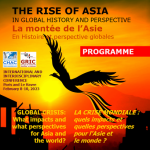The BRICS Laboratory
Why a Eurispes Workshop on the BRICS?
The Institute has focused on observing and assessing the profound geopolitical, geoeconomic, and social changes occurring on the global stage, particularly their impact on Italian and European reality.
For more than a decade, the BRICS (Brazil, China, Russia, India, and South Africa) have formed a complex reality that has a significant influence on Italy’s relations system and development policies. This influence is both direct (via bilateral relations and exchanges with the individual member states of this coordination) and indirect (via the regional areas and productive sectors of most significant interest to Italian public and private operators). One example is the BRICS countries’ growing presence in the Mediterranean, a region of particular interest to Italy. In concrete terms, the BRICS initiatives are increasingly influencing our system’s policies and, more broadly, those of the EU, while also providing significant new opportunities for growth and progress.
In light of the profound changes taking place in global development, it is widely assumed that, in the medium term, some of the BRICS coordination states, such as China and India, could play a leading role in global development. Furthermore, the BRICS initiatives to expand their membership to new states (BRICS Plus strategy) and new areas of cooperation (Africa, Eurasia) may have a significant impact on both the global governance system and the terms and conditions of development. As a result, the Eurispes’ conviction that these new perspectives must be fully understood and approached with a long-term, constructive, and collaborative mindset.
Italy and the BRICS share numerous joint commitments defined in Heads of State and Government summits, such as the G20 summits, and platforms approved within international institutions, most notably the United Nations 2030 Agenda for Sustainable Development. As a result, Italy has all the tools it needs to promote positive and beneficial initiatives for common growth and to act as a driving force in the development of new EU policies.
The Eurispes’ contribution to the initiative of the BRICS Laboratory, established in 2015 and comprised of a well-known group of experts, is in this direction. The Laboratory, in keeping with the Institute’s scientific tradition, operates based on a multidisciplinary and systemic method of analysis and evaluation, is a working group open to the most qualified Italian and foreign collaborations, holds periodic meetings and develops analyses, studies, and recommendations for public and private decision-makers.
Documents
- Experts Notes: Anne-Marie Moulton, “Remarks for the briefing to Eurispes”, 12.06.2018, Rome, ENG
- Experts Notes: Paolo MOTTA, “THE GLOBAL EVOLUTION OF BRI – Belt & Road initiative”, 30.10.2018, ENG
- Experts Notes: Enrico MOLINARO “Punti di chiarezza nella strategia BRICS. Un possibile ruolo dell’Italia”/”Points of clarity in the BRICS strategy. A possible role for Italy”, 13rd December 2019 – ITA/ENG
- Experts Notes: Paolo RAIMONDI. “BRICS: local currencies, productive credit and debt reduction. Policies for a new global economic architecture”, Paris/Le Havre, 10th-12nd february 2021 – ENG
- Experts Notes: Paolo MOTTA. “Sustainable urban development and covid 19 pandemic impacts”, Paris/Le Havre, 10th-12nd february 2021 – ENG
- Experts Notes: Enrico MOLINARO. “Collective identity and the Euro-Med Cooperation Revival”, Paris/Le Havre, 12th February 2021 – ENG













